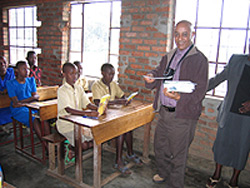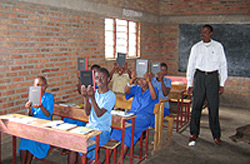|
|
The teacher had her Bible open to Genesis. Her 8 and 9-year-old primary students opened their Bibles to the same passage—Genesis 3—and together they read the story of the fall of Adam and Eve.
I was in the Rwandan town of Gisenyi on the shores of Lake Kivu, near the Congo border. We had come from Sydney to see how Bible Society NSW’s Reconciliation project, run in association with local partner African Enterprise (AE), was working.
The project was developed by local AE staff and is funded by Bible Society NSW. Although it had only been running a short time, everyone involved, from the creators to the teachers and students, could see it was having a real impact.
Being Reconciled
As the teacher continued her lesson, she talked about the concept of reconciliation. An AE staff member from Kigali translated from Kinya-Rwandan into English. She spoke about the barriers that exist between all of us at times and then asked if someone in the class was prepared to nominate another class member with whom they might have a disagreement. After a moment or two, a student put up her hand and indicated another class member. The issue between them was quite minor, but the teacher asked them to stand in front of the class and “be reconciled.” After this first couple volunteered, others did the same. Soon, more than eight pairs of students had apologised to each other.
What a great way of helping children understand the meaning of reconciliation—not only as it is described in the Bible, but also as it is applied to overcoming the barriers between the Hutu and Tutsi tribes that had been the catalyst for over one million deaths in 1994.
None of these children had experienced the Rwanda genocide firsthand; however, they had heard of it from their parents and older family members. In many families, the memories of what happened were very real as they coped with huge gaps in the family structure. In fact, we did not meet one person who had not been personally affected by the deaths of family members in the genocide. In most cases, this was a mother, father, uncle, aunt, and/or grandparent. Teo was one of our drivers, and at twenty-seven, he was the only member of his family still alive.
After our school visit we dropped in on a class of local pastors being trained to run the course in their churches. They were looking at the same Bible passages we had seen discussed at the school. The lecturer developed the Adam and Eve story and shared that even though humanity had sinned against God and broken his laws, we are still able to be reconciled to God through the death of Jesus Christ. ![]()
The story of Jacob and how he was finally reconciled with his brother Esau was used as an example of how, despite wrong on both sides, we can still overcome differences and be reconciled.
At School—At Home
At a meeting of teachers, I heard remarkable stories of how the project had impacted their students and their personal lives.
Vincente told me how she had suffered through the genocide but that going through the teaching meant she had been healed and was now able to help students:
It has been a life-changing experience. I have a nephew who was an orphan from the genocide. He was ten months old when I got him and he grew up to be impossible to handle. One day he said to me, “You are not my mother; you cannot tell me what to do.” He was almost impossible to control, but now he is very active in the Unity Club at school for reconciliation.
Through the teachings, she has seen a real change in him.
I also spoke to students who had taken part in the program. Their response to my questions about what they had learned was inspiring:
Before I went to the club, I was a very angry child and I did not like to pray for other ethnic groups, but since the training, it has helped me. The booklet shows that we are all from the same man, so reading about creation and how God created Adam and Eve and when man committed sin, we started looking at the consequences. This has helped me look at this in my own life and at my own suffering. I now understand we need to put an end to that mentality so we never see the genocide again. – Grace
I learned to ask for forgiveness. Reading from the booklet about Jacob, it touched me and taught me about reconciliation. – Innocent
|
|
Particularly encouraging was the way the project impacted parents as the children told their parents what they were learning at school. Over and over again I heard stories about how children told their parents that they didn’t want to be like them by putting one tribe above another. The message that we are all equal in God’s eyes seems to be getting through.
I also met with Fatuma Ndangiza, executive secretary of the National Unity and Reconciliation Commission, who complimented Bible Society NSW and African Enterprise on the project:
We recognise that children born after the genocide have been affected by the wounds of their parents and/or teachers and this has created an issue within schools where children have been writing and doing terrible things. So we are trying to create Unity Clubs to help this issue; therefore, when AE came to us with an outline of their project, we accepted and are happy to support it.
The challenge of the visit was that everyone we met—teachers, pastors, and children—wanted us to expand the project to more schools and areas of the country so the Bible-based message of the project could be heard by as many people as possible. ![]()
We did some calculations and realized we would need to raise over two million AUD to deliver the project to the 1.3 million primary school students in the country. This is a real challenge for us and our donors as we look at how we might be able to expand the project throughout the country.
Charles Murigande, the Minister for Foreign Affairs, also complimented Bible Society NSW and AE on the program’s effectiveness:
We may not be able to change the mindset of those in the past, but we, as a responsible government, must prevent any future acts. We need a better generation and that is why I consider your program a very important part of the future of our country. You include God as part of your program—without that, it would not be as effective.
Murigande echoed the sentiment that the future of Rwanda was in the hands of its children: “We need to create a new generation who will not even be tempted to do what their parents did.”
We all came away from our visit both challenged and inspired—challenged at the size of the task ahead, but inspired by the way the people of Rwanda are taking the issues of reconciliation and unity seriously. That we can be a part of this process through our Bible Society NSW project is a real God-given privilege.



